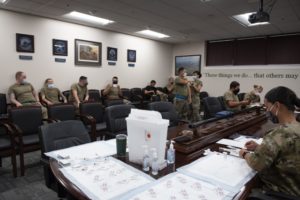
Airmen prepared to receive COVID-19 vaccinations at Moody Air Force Base, GA, in mid-August. Moody AFB held its first mass vaccination line for maintenance airmen on that date. U.S. Air Force photo by Airman 1st Class Megan Estrada
WASHINGTON — The Food and Drug Administration’s full approval of the Pfizer-BioNTech COVID-19 vaccine paved the way for a sweeping vaccine mandate for military personnel.
Just hours after the FDA’s announcement last month, DoD officials announced they would be requiring vaccination of all servicemembers.
“The secretary articulated that it was his intent to mandate the COVID-19 vaccines upon FDA licensure or by mid-September to seek a waiver from the president,” Pentagon Press Secretary John Kirby explained at a briefing the day of the FDA’s announcement. “Now that the Pfizer vaccine has been approved, the department is prepared to issue updated guidance requiring all servicemembers to be vaccinated. A timeline for vaccination completion will be provided in the coming days. The health of the force—of the military, civilian employees, families and communities is a top priority. These efforts ensure the safety of our servicemembers and promote the readiness of our force, not to mention the health and safety of the communities around the country in which we live.”
How fast DoD can move to vaccinate servicemembers was unknown at the time of the department’s announcement.
“We’re preparing actionable guidance to the force,” Kirby said. “The actual [vaccination] completion date—how fast we want to see it get gone—we’re working on that guidance right now.”
According to military officials, approximately 65% of active duty servicemembers had been inoculated as of early August.
The DoD is not the first federal department to mandate a vaccine for its employees, but it has been one of the most highly anticipated. A 2003 law prevents DoD from mandating a drug approved under an emergency use authorization (EUA), which the available vaccines have been. The law’s creation stems from the military’s use of an anthrax vaccine on troops during the 1990s. There was concern by some servicemembers that the drug, which had been approved for cutaneous infection, not inhalation anthrax, was linked to Gulf War Syndrome. This led to a change in regulation that allows servicemembers to refuse to take any drug being administered for something for which it was not explicitly approved.
President Joe Biden could have provided a waiver, bypassing the law and allowing DoD to mandate the vaccine, which along with others from Moderna and Johnson and Johnson, had emergency use authorization. With the full approval of Pfizer, that will not be unnecessary.
HHS also announced a new vaccine mandate last month, requiring vaccination of 25,000 healthcare workers in the Indian Health Service, National Institutes of Health and other employees who come into direct contact with patients. Additionally, vaccination will be required of all members of the U.S. Public Health Service Commissioned Corps.
VA was the first federal agency to require vaccination for some of its employees, and, in mid-August, expanded that mandate to include an additional 250,000 workers. The original mandate was for Title 38 VA healthcare personnel who work or visit VHA facilities, or who provide direct care to veterans. The updated mandate will include Title 5 healthcare personnel such as psychologists, pharmacists, medical support assistants, engineers and housekeepers.
“We’re now including most VHA employees and volunteers and contractors in the vaccine mandate because it remains the best way to keep veterans safe, especially as the delta variant spreads across the country,” VA Secretary Denis McDonough said. “This pandemic is not over, and VA must do everything in our power to protect veterans from COVID-19. With this expanded mandate, we can once again make and keep that fundamental promise.”
VA employees have eight weeks from the announcement on Aug. 13 to provide proof of vaccination to their local VHA Occupational Health Office.
Now granted full approval, the Pfizer vaccine will be marketed as Comirnaty and is available for people age 16 and over. The vaccine remains under an EUA for those age 12-15, as well as for third doses administered to immunocompromised individuals.
The EUA has been cited by many as the main reason they were hesitant to get vaccinated. Officials say they are hopeful that Pfizer’s full approval will result in an uptick in vaccinations.
“If you’re one of the millions of Americans who said they will not get the shot until it has full and final approval of the FDA, that has now happened,” Biden declared the day the drug was approved. “The moment you’ve been waiting for is here. It’s time to get your vaccination. Get it today. It’s an important moment in our fight against the pandemic. FDA approval is the gold standard.”
He added, “The delta variant is dangerous and spreading, causing a pandemic of the unvaccinated. Nationwide cases are still rising. Across the country, virtually all the COVID-19 hospitalizations and deaths continue to be among the unvaccinated. Cases where vaccinated people get COVID are far less common. And most importantly, their conditions are far less severe.”
